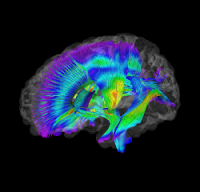Health News
Researchers have found significant differences in brain development starting at age 6 months in high-risk infants who develop autism compared to those who don't. The finding suggests the disorder develops over time and doesn't have a sudden onset, which is often believed to be the case.
- Study Suggests That Adolescent Exposure To Alcohol Can Negatively Affect Learning, Memory And Behavior In Adulthood
A study at Duke University suggests that repeated exposure to alcohol during adolescence causes long-lasting changes in the part of the brain that controls learning and memory. The study, published in the journal Alcoholism: Clinical & Experimental...
- Fragile X Syndrome, A Little Known Disorder, Is The Leading Inherited Cause Of Intellectual Disabilities; U Of L Has Only Clinic For It In Ky.
A common but little-known genetic disorder called Fragile X Syndrome is the leading inherited cause of intellectual disability, autism and developmental delay, and the University of Louisville is home to the only Fragile X clinic in Kentucky, the university...
- Vaccine Against Measles, Mumps And Rubella Doesn't Cause Autism, So Get Your Children Immunized, Uk Doctor Says
A University of Kentucky psychiatrist is encouraging parents to get their children vaccinated for measles, mumps and rubella (MMR) now that scientists have found no connection between the vaccine and autism. "I really want the word out there that vaccines...
- Health Awareness Observances For The Month Of April
What are the symptoms of autism? Do you know the best way to protect your infant against vaccine-preventable diseases? How do you prevent meningitis? If you don?t know the answers to these questions and you want to educate yourself about autism, infant...
- No Link Between Vaccines And Autism
This week yet another report showed that a study linking vaccines to autism was fraudulent. The controversy began more than a decade ago. In 1998, British physician Andrew Wakefield published a study indicating that the common MMR (Measles, Mumps, Rubella)...
Health News
Brains of autistic children develop differently, study finds
 |
| MRI image of young brain in study |
"It's a preliminary, albeit great, first step towards thinking about developing a biomarker for risk in advance of our current ability to diagnose autism," said Jason J. Wolff, lead author of the study.
The study may be useful for journalists writing new stories about autistic children and their parents; April is National Autism Awareness Month. It raises the possibility "that we may be able to interrupt that process with targeted intervention," Wolff said.
Participants in the study, which was published online in the Advance section of the American Journal of Psychiatry, included 92 infants who have older siblings with autism and so were considered at high risk for developing the disorder. They were tested using a type of MRI at 6 months of age and had behavioral assessments done at 24 months. Most of the infants also had more brain-imaging scans at either or both 12 and 24 months of age, reports research-reporting service Newswise.
At 24 months, 28 infants ? 30 percent ? fell into the autism disorder spectrum, while 64 did not. "The two groups differed in white matter fiber tract development ? pathways that connect brain regions ? as measured by fractional anisotropy," Newswise reports.
Based on the way water molecules move through brain issue, fractional anisotrophy measures the way white matter is organized and develops. In 12 of the 15 tracts of children who did develop autism, there were significant FA trajectories. "This evidence, which implicates multiple fiber pathways, suggests that autism is a whole-brain phenomenon not isolated to any particular brain region," Wolff said. (Read more)
- Study Suggests That Adolescent Exposure To Alcohol Can Negatively Affect Learning, Memory And Behavior In Adulthood
A study at Duke University suggests that repeated exposure to alcohol during adolescence causes long-lasting changes in the part of the brain that controls learning and memory. The study, published in the journal Alcoholism: Clinical & Experimental...
- Fragile X Syndrome, A Little Known Disorder, Is The Leading Inherited Cause Of Intellectual Disabilities; U Of L Has Only Clinic For It In Ky.
A common but little-known genetic disorder called Fragile X Syndrome is the leading inherited cause of intellectual disability, autism and developmental delay, and the University of Louisville is home to the only Fragile X clinic in Kentucky, the university...
- Vaccine Against Measles, Mumps And Rubella Doesn't Cause Autism, So Get Your Children Immunized, Uk Doctor Says
A University of Kentucky psychiatrist is encouraging parents to get their children vaccinated for measles, mumps and rubella (MMR) now that scientists have found no connection between the vaccine and autism. "I really want the word out there that vaccines...
- Health Awareness Observances For The Month Of April
What are the symptoms of autism? Do you know the best way to protect your infant against vaccine-preventable diseases? How do you prevent meningitis? If you don?t know the answers to these questions and you want to educate yourself about autism, infant...
- No Link Between Vaccines And Autism
This week yet another report showed that a study linking vaccines to autism was fraudulent. The controversy began more than a decade ago. In 1998, British physician Andrew Wakefield published a study indicating that the common MMR (Measles, Mumps, Rubella)...
